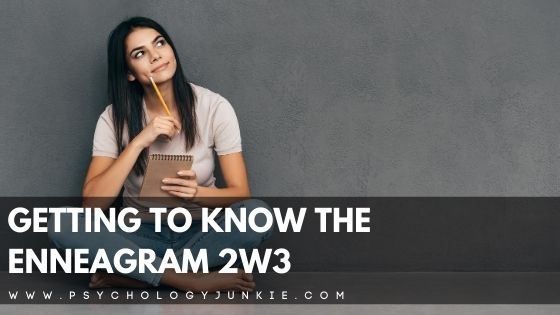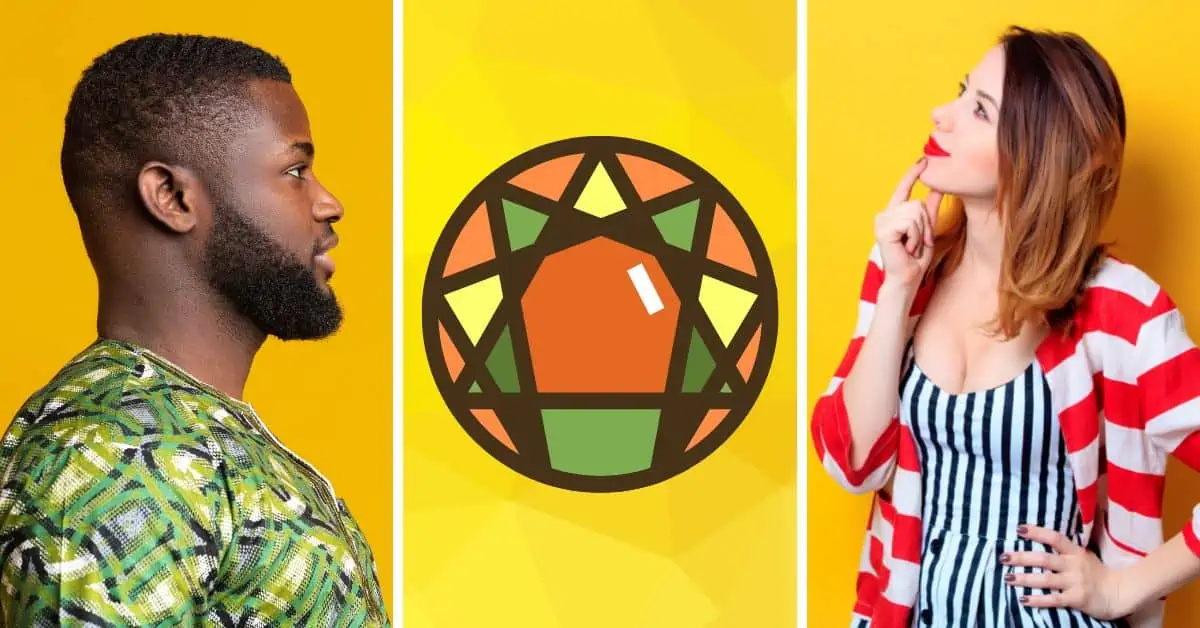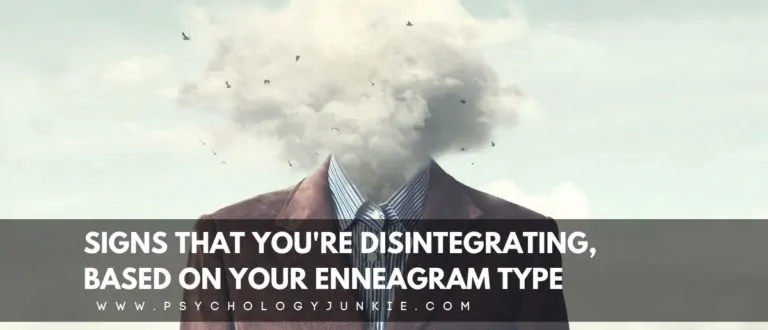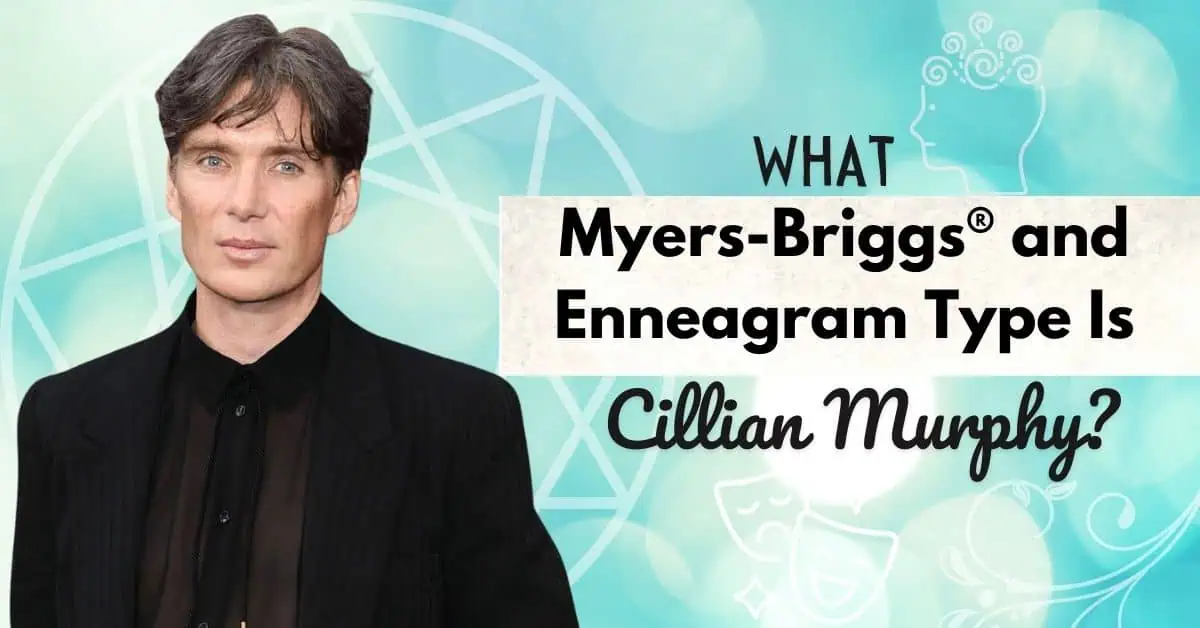Getting to Know the Enneagram 2w3
So you’re wondering if you or someone you love is an Enneagram 2w3. Thankfully, you’re in the right place. Today we’re going to unpack what makes a 2w3 stand out, what makes them different from a 2w1, and what a “wing” even means when it comes to your personality! Let’s get started.
Not sure what your enneagram type is? Take our new personality questionnaire here!

This article contains affiliate links. If you purchase an eBook or print book from one of my links I get a small percentage back to help run my site.
Table of contents
Estimated reading time: 9 minutes
A Deeper Look at the Enneagram 2w3

What is a Wing Anyway?
Your wing is the second side of your personality. It acts as a sidekick to your inner motivations, goals, and unconscious needs. You have your core type (in this case, the Two), but the Wing is an extension or ‘helper’ to your core type.
When you understand your wing, you can gain a more profound look at your inner motivations and how they show up in your day-to-day life.
2w1 vs 2w3 – What’s the Difference?
Two with Three wings have a profound desire for achievement and success. This type is usually more charming and seductive than the Two with a One wing (although 2s, in general, have a knack for being seductive). The 2w3 can instantly read a room and know how to blend in and make a positive impression. And being seen in a positive light is crucial for the 2w3.
Twos with a Three wing are usually more witty and adaptable than Twos with a One wing. Twos with a One wing are driven by their morals to a much stronger degree. There’s a seriousness to the 2w1 that the 2w3 doesn’t emulate as powerfully. 2w3s are often less self-critical than 2w1s are, but they are also prone to workaholism and an endless yearning for success and achievement that 2w1s aren’t as focused on.
The Enneagram 2w3 and Image
To the 2w3, image is crucial. Talent is vital. 2w3s enjoy seeing the potential in others and guiding them towards that potential. They enjoy making an impact and winning people over with their charisma and empathy. These types are less likely to be caretakers and more likely to be motivational speakers or high-powered leaders. That said, they still make time for people and enjoy listening to them and making time for their concerns. They love giving advice and inspiration or just making their friends laugh or enjoy the finer things in life.
Twos with a Three wing are more task-driven and success-oriented than Twos with a One wing. Twos with a One wing believe in a personal mission of generosity and caretaking. They will get into the trenches with people and offer them physical and practical support. These types hold themselves to a strict moral standard and have idealistic views of how they should behave. They are the “Good Samaritans” and live to be dutiful, proper, and good. While 2w3s also want to be good and selfless, they are more driven to success and achievement than moral uprightness (even if that is also a goal). They are more willing to bend to blend in than the 2w1. Practical tasks and nitty-gritty detail work bores them, whereas those kinds of tasks can be satisfying to a 2w1. Instead, the 2w3 wants to inspire people make an impact, and make big steps without worrying about minutiae. 2w3s are also more likely to appear arrogant and image-conscious when they are stressed, while the 2w1 is more likely to appear self-righteous and critical when they are stressed.
The Root Desire of the Enneagram 2: To be loved
The Root Fear of the Enneagram 2: To be worthless or unlovable
The Vice of the Enneagram 2: Pride
Signs That You’re a 2w3 Enneatype:
(Several of these will also apply to 2w1, but 2w1s are less likely to relate to all of them)
- You care deeply about people and want to inspire them to live up to their potential.
- You want to appear generous and attractive.
- You never want to appear needy, unsuccessful, or vulnerable.
- You’re an excellent listener with a strong sense of empathy.
- You can quickly “read” a room and blend in or stand out.
- You try to appear optimistic, witty, and engaging.
- You enjoy being a leader and motivating people.
- You are comfortable being visible and the center of attention.
- You like having power.
- You appear friendly and good-humored.
- You enjoy creating strong personal connections.
- You’re more driven by success than idealism.
- You gain your self-esteem through your personal qualities and skills.
- You enjoy entertaining others.
- You are focused and ambitious.
- You’re more focused on giving people quality attention than caretaking for them.
- You know how to make people like you.
- During immature phases, you can be self-important, arrogant, or overly fixated on your image.
- You pay a lot of attention to how you dress, style your hair, or the kind of house you live in or car you drive.
- Symbols of success mean a lot to you.
- You enjoy giving people gifts or tokens of affection.
- You are genuinely concerned for others.
- You are driven, energetic, and efficient.
- You avoid expressing your needs because you’re afraid you’ll be rejected.
- You want to be needed.
- You tend to be overly competitive.
- You are energized by making a measurable difference in the world.
- You are drained by failing to accomplish your goals.
- You have a passion for serving others and inspiring them.
- You long to build deep, personal connections.
- You worry that your needs are “too much” for other people.
Famous 2w3s:
Luciano Pavarotti, Barbara Bush, Barry Manilow, Richard Simmons, Lillian Carter, Sammy Davis Jr., Leo Buscaglia, Doug Henning, Tommy Tune, John Denver, Pat Boone, Doris Day, Jessica Alba, Dolly Parton, Elle Fanning, Stevie Wonder, and Debbie Reynolds.
The Childhood Struggle of the 2w3:
As children, Twos often felt like by exerting their desires and needs they were in the way. While they didn’t disappear or numb out like the Nine enneatype, they learned to repress their needs in favor of tuning into the needs of others. They learned that by meeting other people’s needs they would get love or positivity in exchange. Thus, they accepted the unconscious message that “I can only get affection or care by meeting other people’s needs and being the person they want me to be.”
Twos learned that people love flattery, that people want to laugh, be listened to, and be emotionally supported. They learned to “read” people’s emotional states with precision. Unfortunately, in the process, they wind up disowning their true self in order to create a specific image or persona to get the approval they needed.
There’s an underlying grief of the Two enneatype. That grief stems from a deep sense that they are unlovable, and the only way they’ll get their needs met is by altering themselves for others. Even when Twos do receive love, it usually isn’t enough because the love they’re getting is for the persona, not for their true self. Sadly, this inner self becomes more and more hazy and distant if the Two never gets the opportunity to grow, heal, and experience genuine affection.
Growing and Thriving as a Two:
- When you feel like you just have to do something for someone else, pause and reflect. What do you need right now? Perhaps you’re projecting your needs onto that other person or you’re repressing your needs in favor of meeting others’ needs. Acknowledge your needs and start becoming aware of them.
- When you find yourself drawn to someone, take some time to focus on why you’re drawn to them. Is it because they seem needy in some way and you feel like you could “rescue” them? Make sure you’re not constantly getting involved with fixer-uppers who leave you depleted, worn out, and overextended.
- Listen to your body. Many times you overwork yourself in order to achieve your goals or help others. Learn to feed yourself when you’re hungry without binging, learn to rest when you need rest. Give yourself the kind of consideration you’d give someone you love.
- Remember that it is impossible for everyone to like you. Let yourself off the hook. Try to let go of worrying about what other people think of you.
- Work on creating healthy boundaries. Learn how to be fully in your own body and mind when other people are talking to you. Instead of “reading” them or instantly thinking of how you can help, stay connected to yourself. This doesn’t mean you should be cold or unfeeling with them. It just means that you should respect yourself. Say no when you don’t want to do something. Stand firm when you don’t agree with someone. Tap into your own point of view instead of always empathizing and identifying with the other person in the situation.
- Realize when you are practicing false humility and try to reflect on why you are using that in the moment. Is it because you’re worried that deep down you are worthless? Is it because you’re worried about abandonment? Think about your reasons.
- Be brutally honest with yourself about your reasons and motives for doing anything. Is it because you’re hoping to get something in return? Is it because you’re feeling insecure? Is it because you are hurting and you want to heal that hurt by getting some acknowledgment? Understanding your motives can help you to grow. It can also help you to stick to healthier boundaries. Make a commitment with yourself that you won’t do kind things in order to get something back. Learn to ask for what you need instead of repressing your needs to please others.
Other Articles You Might Enjoy:
The Enneagram Types of Your Favorite Movie Stars
Seven Struggles of the Enneagram Two Personality Type
Sources:
The Wisdom of the Enneagram by Don Richard Riso and Russ Hudson
Personality Types – Using the Enneagram for Self-Discovery by Don Richard Riso with Russ Hudson
Bringing Out the Best in Everyone You Coach – Use the Enneagram System for Exceptional Results by Ginger Lapid-Bogda
The Complete Enneagram – 27 Paths for Greater Self Knowledge by Beatrice Chestnut
What Are Your Thoughts?
Did you enjoy this article? Do you have any suggestions or insights to share? Let us know in the comments!
Find out more about your personality type in our eBooks, Discovering You: Unlocking the Power of Personality Type, The INFJ – Understanding the Mystic, and The INFP – Understanding the Dreamer. You can also connect with me via Facebook, Instagram, or Twitter!


Subscribe to Our Newsletter

Want to discover more about personality type? Get the inside scoop with Susan Storm on all things typological, along with special subscriber freebies, and discounts on new eBooks and courses! Join our newsletter today!













2 Comments